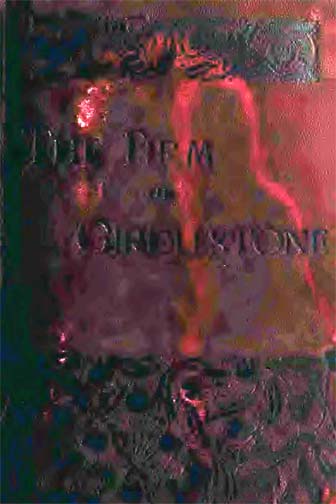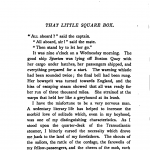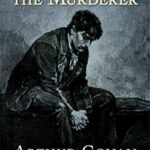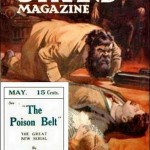
His father’s encouraging words had given Ezra Girdlestone fresh heart, and he had renewed his importunities with greater energy than ever. Never surely did any man devote every moment of his time more completely to the winning of a woman’s heart. From morning until night the one idea was ever before his mind and every little want of Kate’s was forestalled with a care and foresight which astonished her. The richest fruit and flowers found their way unexpectedly into her room; her table was littered with the latest books from Mudie’s, and the newest pieces lay upon her music-stand. Nothing which attention and thoughtfulness could do was left undone either by the father or the son.
In spite of these attentions, however, and the frequent solicitations of her guardian, Kate stood firmly to her colours. If the Tom of the present were false, she at least would be true to the memory of the Tom of other days, the lad who had first whispered words of love into her ears. Her ideal should remain with her whatever might befall. No other man could ever take the place of that.
That Tom was from some unexplained and unaccountable reason false to her appeared to be beyond all question. Her trusting and innocent heart could not dream of the subtle network which was being wound round her. Her secluded life had left her very ignorant of the ways of the world, and the possibility of an elaborate deceit being practised upon her had never occurred to her. From the day that she heard the extract of the letter read by her guardian she never doubted but that such letters were received at the office by the man who professed to love her. How could she hesitate to believe it when it was confirmed by his avoidance of Eccleston Square and of herself? The cause of it all was a mystery which no amount of speculation could clear up. Sometimes the poor girl would blame herself, as is the way of women in such cases. “I have not seen enough of the world,” she would say to herself. “I have none of the charms of these women whom I read of in the novels. No doubt I seemed dull and insipid in his eyes. And yet—and yet—” There always remained at the end of her cogitations the same vague sense of bewilderment and mystery.
She endeavoured as far as possible to avoid Ezra Girdlestone, and stay in her room for the most part on the days when he was at home. He had, however, on the advice of his father, ceased pressing his suit except in the silent manner aforementioned, so that she gradually took courage, and ended by resuming her old habits. In her heart she pitied the young merchant very sincerely, for he was looking haggard and pale. “Poor fellow,” she thought as she watched him, “he certainly loves me. Ah, Tom, Tom! had you only been as constant, how happy we should be!” She was even prompted sometimes to cheer Ezra up by some kind word or look. This he naturally took to be an encouragement to renew his advances. Perhaps he was not far wrong, for if love be wanting pity is occasionally an excellent substitute.
One morning after breakfast the elder Girdlestone called his son aside into the library. “I’ve had a notice,” he said, “as to paying up dividends. Our time is short, Ezra. You must bring matters to a head. If you don’t it will be too late.”
“You mustn’t pick fruit before it is ripe,” the other answered moodily.
“You can try if it is ripe, though. If not, you can try again. I think that your chance is a good one. She is alone in the breakfast-room, and the table has been cleared. You cannot have a better opening. Go, my son, and may Heaven prosper you!”
“Very well. Do you wait in here, and I shall let you know how things go.”
The young man buttoned up his coat, pulled down his cuffs, and walked back into the breakfast-room with a sullen look of resolution upon his dark face.
Kate was sitting in a wicker chair by the window, arranging flowers in a vase. The morning sunlight streaming in upon her gave a colour to her pale face and glittered in her heavy coils of chestnut hair. She wore a light pink morning dress which added to the ethereal effect of her lithe beautiful figure. As Ezra entered she looked round and started at sight of his face. Instinctively she knew on what errand he had come.
“You will be late at Fenchurch Street,” she said, with a constrained smile. “It is nearly eleven now.”
“I am not going to the office to-day,” he answered gravely. “I am come in here, Kate, to know my fate. You know very well, and must have known for some time back, that I love you. If you’ll marry me you’ll make me a happy man, and I’ll make you a happy woman. I’m not very eloquent and that sort of thing, but what I say I mean. What have you to say in answer?” He leaned his broad hands on the back of a chair as he spoke, and drummed nervously with his fingers.
Kate had drooped her head over the flowers, but she looked up at him now with frank, pitying eyes.
“Put this idea out of your head, Ezra,” she said, in a low but firm voice. “Believe me, I shall always be grateful to you for the kindness which you have shown me of late. I will be a sister to you, if you will let me, but I can never be more.”
“And why not?” asked Ezra, still leaning over the chair, with an angry light beginning to sparkle in his dark eyes. “Why can you never be my wife?”
“It is so, Ezra. You must not think of it. I am so sorry to grieve you.”
“You can’t love me, then,” cried the young merchant hoarsely.
“Other women before now would have given their eyes to have had me.
Do you know that?”
“For goodness’ sake, then go back to the others,” said Kate, half amused and half angry.





